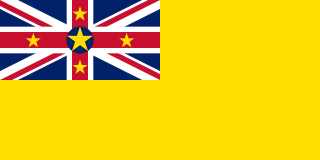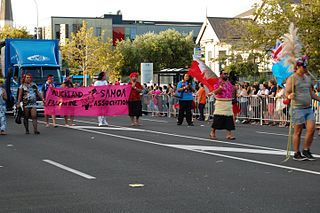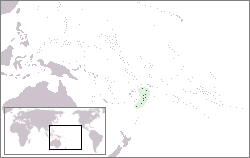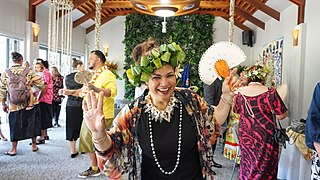
Niue is a self-governing island country in free association with New Zealand. It is situated in the South Pacific Ocean and is part of Polynesia, and predominantly inhabited by Polynesians. The island is commonly referred to as "The Rock", which comes from the traditional name "Rock of Polynesia".

Pacific Islanders, Pasifika, Pasefika, Pacificans or rarely Pacificers are the peoples of the Pacific Islands. As an ethnic/racial term, it is used to describe the original peoples—inhabitants and diasporas—of any of the three major subregions of Oceania.
A fakaleitī is a Tongan individual assigned male at birth who has a feminine gender expression. The term fakaleitī is made up of the prefix faka- and the borrowing lady from English. Fakaleitīs themselves prefer to call themselves leitī or ladies.
Niuean is a Polynesian language, belonging to the Malayo-Polynesian subgroup of the Austronesian languages. It is most closely related to Tongan and slightly more distantly to other Polynesian languages such as Māori, Samoan, and Hawaiian. Together, Tongan and Niuean form the Tongic subgroup of the Polynesian languages. Niuean also has a number of influences from Samoan and Eastern Polynesian languages.
Miss Galaxy Queen is a beauty pageant held in Nukuʻalofa, Tongatapu in Tonga, where contestants are members of Tonga's fakaleiti community. Organised by the Tonga Leitis' Association (TLA) it raises awareness of LGBTQ+ rights issues and has become a regular event in the Tongan cultural calendar.
Māhū in Native Hawaiian and Tahitian cultures are third gender people with traditional spiritual and social roles within the culture, similar to Tongan fakaleiti and Samoan fa'afafine. Historically the term māhū referred to people assigned male at birth (AMAB), but in modern usage māhū can refer to a variety of genders and sexual orientations.

Faʻafafine are people who identify themselves as having a third gender or non-binary role in Samoa, American Samoa and the Samoan diaspora. A recognised gender identity/gender role in traditional Samoan society, and an integral part of Samoan culture, faʻafafine are assigned male at birth, and explicitly embody both masculine and feminine gender traits in a way unique to Polynesia. Their behaviour typically ranges from extravagantly feminine to conventionally masculine.
Diane Massam is a Canadian linguist, Professor Emeritus at the University of Toronto.

The following outline is provided as an overview of and topical guide to Niue:

Lesbian, gay, bisexual, and transgender (LGBT) people in Niue face legal challenges not experienced by non-LGBT residents. Male same-sex sexual activity is illegal in Niue, although there is no recent instance of it being actively prosecuted. Same-sex couples and households headed by same-sex couples are not eligible for the same legal protections available to opposite-sex married couples.

Lesbian, gay, bisexual, and transgender (LGBT) people in Tokelau face legal challenges not experienced by non-LGBT residents. Both the male and female kinds of same-sex sexual activity are legal in Tokelau, but same-sex couples and households headed by same-sex couples are not eligible for the same legal protections available to opposite-sex married couples.
Akava'ine is a Cook Islands Māori word which has come, since the 2000s, to refer to transgender people of Māori descent from the Cook Islands.

Lesbian, gay, bisexual, and transgender (LGBT) people in Tonga face legal challenges not experienced by non-LGBT residents. Male homosexuality is illegal in Tonga, with a maximum penalty of 10 years imprisonment, but the law is not enforced.

Niue is an island in the Southern Pacific, mostly inhabited by Polynesians. The plantations are mostly filled with manioc, taro and breadfruit, but banana trees can be found. The wide range of exotic plants in Niue includes taros, pawpaw, coconuts, bananas, yams, cassavas and breadfruits: All are intensively used in the local cuisine.
Binabinaaine, or pinapinaaine, are people who identify themselves as having a third-gender role in Kiribati and Tuvalu, and previously in the Gilbert and Ellice Islands which reunited the two archipelagoes. These are people whose sex is assigned male at birth, but who embody female gendered behaviours.

Phylesha Brown-Acton is a Niuean fakafifine LGBTQ+ rights activist. In 2019, she was appointed a Member of the New Zealand Order of Merit to recognize her work with LGBTQ+ communities from the Pacific countries.
Vakasalewalewa are people from Fiji, who were assigned male at birth but who have a feminine gender expression. In Fiji this is understood as a traditional third gender identity, culturally specific to the country.
Palopa is a term used in Papua New Guinea and the diaspora as a non-heteronormative term for people who may identify in Western nomenclature as either gay, transsexual, or having a third gender role. LGBTQ+ activist Clint Woolly has described how Western terminology is stigmatised by many in Papua New Guinea, and that indigenous descriptors, such as palopa, should be adopted and adapted. For the Sambian people, the phrase kwolu-aatmwol describes a third gender identity. Terminology is also borrowed from other Pacific communities, for example the term 'sister-girl' from Torres Strait Islanders.

Amanaki Lelei Prescott-Faletau is an actor, writer, dancer, choreographer, producer and director of Tongan descent, living in New Zealand. As a playwright, she became the first fakaleitī to have her work published in New Zealand with Inky Pinky Ponky. This play was awarded Best Teenage Script (2015) by New Zealand Playmarket. As an actor, she was awarded best performance at the 2015 Auckland Fringe Festival for Victor Rodger's Girl on the Corner. Her acting credits include The Breaker Upperers (2018), SIS (2020), The Panthers (2021), The Pact (2021) and Sui Generis (2022), in which she is also a writer for the TV series. Faletau competed as a dancer in the World Hip Hop Dance Championships in 2011 and has been a judge at the National Hip Hop Championships in New Zealand over several years.

Pasifika New Zealanders are a pan-ethnic group of New Zealanders associated with, and descended from, the indigenous peoples of the Pacific Islands outside of New Zealand itself. They form the fourth-largest ethnic grouping in the country, after European descendants, indigenous Māori, and Asian New Zealanders. Over 380,000 people identify as being of Pacific origin, representing 8% of the country's population, with the majority residing in Auckland.








